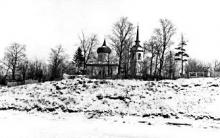Moral problems associated with sin and repentance have always worried Russian literature. A. S. Pushkin staged it extensively in the drama “Boris Godunov.” In an era of social unrest, the main character of the work - the future Tsar Boris - commits a crime, which he commits with the wrong hands. This event is the murder of the son of Ivan the Terrible, heir to the Russian throne in Uglich. Throughout his subsequent life, Boris Godunov tries to justify himself before fate and the people, carrying out various reforms in his life, performing good deeds. But all his endeavors are doomed to complete failure. The country is overtaken by hunger, destruction, and disease.
F. M. Dostoevsky raised the problem of sin and repentance especially acutely in his work. This theme is painted in tragic tones, and the tragedy unfolds in everyday life, at the objective level. But he depicts this life far from the way other realist writers did - the whole universe condenses before the reader.
In the novels of this writer, there is a conflict between a strong personality and his conscience. The sin that his heroes commit is closely related to the idea that has taken possession of the character.
This is especially evident in the novel Crime and Punishment. The plot, the conflict of the work is outlined by the author already in the title. Punishment for a sin committed is inevitable, inescapable, such is the law of life. Moreover, the hero’s most terrible punishment is expressed in his moral torment, in his repentance.
Repentance among Dostoevsky's heroes is often embodied in the motives of madness or suicide. An example of this is fever, depression, Raskolnikov’s illness and Svidrigailov’s suicide. If the hero remains alive, he begins a new life - and each time through hard labor (Raskolnikov, Rogozhin, Mitya Karamazov).
The problem of moral sin and repentance was raised not only by F. M. Dostoevsky, but also by M. E. Saltykov-Shchedrin. If Raskolnikov in the novel “Crime and Punishment” commits a crime not only against his conscience, but also punishable by law, then the main character of the novel “Lord Golovlevs” Judushka slowly, purposefully, imperceptibly leads to the destruction of the entire Golovlev family.
This novel - a family chronicle - can rightly be called the story of the dead. First, the eldest son Stepka the dunce dies tragically in his own home, followed by Porfiry’s younger brother Pashka the quiet one, Anna Petrovna’s daughter Lyubinka commits suicide, all of Judushka’s children die - the elder Vladimir and little Petenka. The “head of the house” Arina Petrovna also dies in misfortune.
Judas is directly responsible for the death of every family member. With his fanatical speeches and meanness, he deceived, brought the closest people to the brink solely for the sake of monetary gain, in order to get his mother’s estate. At the end of his dissolute, vile life, a small chance appears for the revival of the family - the birth of a son, Petenka. But Judas orders his mother to kill the unborn child. At the end of the novel, the writer shows the awakening of the hero’s conscience, but this awakening does not lead to a moral revival of the individual. Enlightenment comes sooner or later for everyone, but for Judas it came too late, when nothing could be changed.
Thus, the theme of sin and repentance runs through the work of many Russian writers. They paid great attention to cultivating a person's moral sense. Retribution inevitably comes to criminals in various forms: terrible visions, dreams, illnesses, death. A feeling of shame can revive a person to a new life free from torment. But often this feeling comes to the heroes too late. It is noteworthy that at one time T. Mann called Russian literature “sacred” precisely for its attention to the problems of conscience, sin, retribution and human repentance.
- Essay sample.
- Text to the essay by S. Lvov;
The problem of our guilt before loved ones, the problem of repentance
Composition
Why are young people so eager to leave their home, family, and loved ones? After all, then they, like the prodigal son from the Gospel parable, often repent of their deeds. The problem of guilt towards loved ones and the problem of repentance are posed in the text by S. Lvov.
This problem falls into the “eternal” category. It is relevant in all centuries and times. That is why the author wants to reflect on this, to point out to readers its importance.
S. Lvov tells us about the fate of the famous German artist A. Durer. In his youth, he left his home, left his family, his wife and parents, and went to Italy. At this time, the plague epidemic was just beginning in Nuremberg. Talking about this story, the author reveals the feelings of parents left behind by their children: “Who hasn’t waited for months, or even years, for news from a child who left their father’s house! How many people are familiar with sleepless nights, when you mentally imagine your child hungry, undressed, shoeless, sick, and the thought that you are powerless to help him, feed him, clothe him, caress him, pierces your heart with helplessness and horror.” It was after this trip that Durer created his famous engraving “The Prodigal Son”. And in the features of her hero we notice a tangible resemblance to the artist himself. Dürer obviously experienced the same acute feeling of melancholy and repentance that A.S. wrote about. Pushkin. And this feeling is familiar to each of us. However, “you can’t turn back time.” Therefore, we must be kinder, more attentive, and more tolerant in our relationships with loved ones. This is precisely the author’s position in this passage.
S. Lvov's text is very figurative, bright, expressive. He uses a variety of tropes and rhetorical figures: epithets (“with great joy,” “impatient thirst for youth”), metaphor (“the thought pierces the heart with helplessness and horror”), question-and-answer form of presentation (“Dürer could have experienced a feeling of repentance in Italy, that he left his homeland, leaving his relatives in danger? Could he, and probably even experienced it?
I completely share the position of S. Lvov. The feeling of belated repentance is familiar to each of us. Therefore, we must think about what our family means to us. K.G. writes about the daughter’s feelings of guilt before her deceased mother. Paustovsky in the story “Telegram”. The main character of the story, Nastya, lives a bright, eventful, interesting life. She works in the Union of Artists, tries to help people, restore justice - she arranges an exhibition for one of the talented sculptors. At the same time, Nastya remains indifferent to the fate of her own mother, who lives far from her. She doesn't even have time to come to her funeral. In the finale, Paustovsky’s heroine cries bitterly, suddenly realizing what she has lost. Nastya's behavior is both cruel and immoral. According to the writer, vanity and petty worries should not consume a person. All the ostentatious kindness and care are worthless if we are indifferent to our loved ones.
A belated feeling of repentance also visits the hero of V. Astafiev’s autobiographical story “The Last Bow.” Like the prodigal son in the parable, his hero left his home long ago. And then his grandmother died, left in her native village. But they didn’t let him go from work for this funeral. And the grandmother, who raised and raised the boy, was everything for him, “everything that is dear in this world.” “I had not yet realized the enormity of the loss that had befallen me,” writes V. Astafiev. “If this happened now, I would crawl from the Urals to Siberia to close my grandmother’s eyes and give her my last bow. And lives in the heart of wine. Oppressive, quiet, eternal.<...>I don’t have words that could convey all my love for my grandmother, that would justify me to her.”
Thus, the family, according to S. Lvov, is our small homeland. Therefore, we will appreciate every minute spent with loved ones, we will love and take care of them.
Text for the essay
While working on a book about the artist Albrecht Durer, I learned that, soon after he got married, he left his native Nuremberg for Italy. Left unexpectedly. Hastily. Leaving my wife and parents at home. He left just when the plague epidemic began in Nuremberg.
Many biographers of Dürer have tried to explain this trip to Italy. And they couldn't. And I tried. And I couldn’t either. And how can you explain it? But it seems to me that the boundless sharpness of repentance that permeates his engraving “The Prodigal Son,” created shortly after this trip, explains something.
I will not be able to describe this engraving and the thoughts that it evokes in me differently than I did in my book “Albrecht Durer”. I present here this description with some abbreviations. Among the gospel parables, the parable of the prodigal son turned out to be especially understandable and close to many people. He impatiently demanded his share of the inheritance from his father, “went to a distant place and there squandered his property, living dissolutely.” Having gone broke, he learned of hunger and hard work. Having repented, he returned to his father, and he received him with great joy.
This story has worried people for centuries not only with its allegorical, but also with its direct meaning. It is clear to everyone who has children and who knows how they are eager to grow up from under their parents’ roof, how unreasonably, in the parents’ opinion, they use their barely acquired freedom, wasting, if not money, then time and health. Who hasn’t waited for months, or even years, for news from a child who left his father’s house! How many people are familiar with sleepless nights, when you mentally imagine your child hungry, undressed, shoeless, sick, and the thought that you are powerless to help him, feed him, clothe him, caress him, pierces the heart with helplessness and horror. Who doesn’t understand the happiness of the unexpected return of your flesh and blood, when past grievances seem absurd, when nothing is sorry for the returnee, if only he could live longer in his father’s house, and most importantly, if only he were happy. But also the impatient thirst of youth to live their own lives, free from parental care and guidance, the trials that befell the one who set out on a journey along the path of life, the bitterness of regrets about what was lost, the sharpness of repentance when it seems that one is ready to endure everything, everything, anything, just to return to your own people, the great happiness of crossing your native threshold and finding everyone alive - all these feelings are also close and understandable to people. Everyone was a son before becoming a father.
Peering at Durer's engraving, we notice with amazement that in the face of the prodigal son there is a tangible resemblance to the artist himself, as he depicted himself in some self-portraits. The prodigal son has the same shoulder-length curly hair and the same, unexpected for a swineherd farmhand, puffy sleeves of a thin shirt. Could Dürer experience a feeling of remorse in Italy for leaving his homeland, leaving his family in danger? I could and probably even experienced it. But it seems to me that the resemblance of the prodigal son to Durer in this painting means something deeper. An artist, obsessed with his work, is in a hurry to learn as much as possible about life and experience it. This desire is familiar not only to artists. The person who is possessed by it involuntarily moves away from family and friends, sometimes for a while, sometimes forever. Immersed in his search, busy with his business, he does not spare himself, but it happens that he does not spare his relatives either, without meaning to, he becomes cruel towards those closest to him. While he is feeling uplifted, while his work is going well, he does not notice this alienation. But the work was difficult or failed, and my strength dried up. Previously, he could hardly wait for the morning to continue what he started, now he wakes up in anguish before the coming day. Everything that has been done seems worthless, everything that remains to be done seems overwhelming. My head is crowded with memories of real and imaginary guilt in front of loved ones, thoughts about money that I thoughtlessly spent, about time that I wasted in vain, about promises that I made but did not fulfill, about hopes that did not live up to. The heart burns with unbearable melancholy, the hands are clenched in despair, the face is distorted by a grimace of pain, and it takes on the expression captured in the engraving “The Prodigal Son.” It could be called both “Repentance” and “Remorse.” In order to depict this state in this way, you need to at least once experience the feeling that Pushkin talks about.
During the literature lessons throughout the entire period of study at school, we met wonderful and talented writers who, in their works, raised a wide variety of issues from people’s lives. And among the popular topics that have been touched upon by writers is the problem of repentance. And this is not an unfounded statement, because there are multiple arguments about the problem of repentance, which I will cite from the literature.
The problem of repentance arguments
In general, this topic was touched upon by many writers, among them Pushkin, Goncharov, Dostoevsky, Shukshin, Astafiev, and Ostrovsky. And this is just a small sample of all those whom I just remembered. But this is enough to give arguments on the topic: The problem of repentance, which was raised by writers.
Thus, Dostoevsky in his work “Crime and Punishment” showed us how difficult it is to live in peace among people after committing a terrible act, in this case, it was murder. The main character could not stand the test of conscience and repented of his deeds. He confessed everything to the investigator and accepted the punishment.
Next we see the hero Shukshin from the work “Kalina Krasnaya”, where the hero is tormented by the fact that he brought so much grief to his loved one, his own mother. He repented, he admitted his mistakes and refused to help his former “friends” with a criminal past, which led to his death.
One cannot help but recall the remorse of the boy who deceived his grandmother in the work “The Horse with a Pink Mane.” Moral education does not allow the boy to live in peace, and he came to his grandmother to confess his deception. The child sincerely repented, so the grandmother forgave and handed over that long-awaited gingerbread. The very situation described in the work, where you need to find the strength to admit guilt, became a lesson not only for the main character, but also for all of us.
We see repentance in Pushkin’s work “The Captain’s Daughter”, where Pyotr Grinev admitted his mistakes made in his youth, in Ostrovsky’s work “The Thunderstorm”, where the heroine repents of her betrayal.
Sometimes when we do something we don’t even think about the consequences and then very often we regret it, because it’s impossible to fix everything. Only after some time does the realization come. In this text, V.P. Astafiev raises the problem of repentance.
The narrator tells about his shameful act, which he committed in childhood: when the singer’s voice was heard through the loudspeaker, the hero, with words of indignation, pulled the plug out of the socket, thereby setting an example for other children.
Many years later, he found himself at a free symphony concert at a resort where they played
decent classical music. Almost immediately, the audience began to show their dissatisfaction: leaving the hall “with indignation, shouting, cursing..., as if they had been deceived in their best desires and dreams.” And the narrator sat, shrinking into himself, and listened to the musicians, remembering his act, but that singer “will never hear my repentance, she will not be able to forgive me,” he thought. “Life is not a letter; there is no postscript in it.”
I completely agree with V.P. Astafiev and believe that everyone learns from their mistakes. Having stumbled once and repented, a person forever remembers his act as a moral lesson.
The problem under discussion is so important that many writers raised it in their works, for example, F. M. Dostoevsky in the novel “Crime and Punishment.” The main character Raskolnikov created a theory according to which people are divided into “trembling creatures” and those who have the right.” To test this, Rodion decided to kill, but it did not bring him happiness. With Sonya's help, the hero managed to atone for his sin through repentance.
V.P. Astafiev has a story “A Horse with a Pink Mane”, where he is concerned about the same problem. The hero deceived his grandmother (he put grass at the bottom of a basket of strawberries). But immediately his conscience began to torment him: upon his grandmother’s return, the boy cried bitterly and repented of what he had done; and my grandmother initially believed that he would confess, so she still bought him a “carrot with a horse.”
Thus, anyone can face this problem, and it can be difficult to solve, but those who are able to realize their own mistakes will never repeat them again.
Other works on this topic:
- Music is considered a thing so amazing that the heart can listen to everything it says! Sometimes the human soul remains deaf, and all because it is important to grow to...
- It is common for every person to commit shameful acts, but not everyone can admit their mistake or repent of what they have done. It is precisely the problem of repentance that Astafiev poses in his text. Thinking...
- Repentance is an incredibly important ability of the human soul. If a person is unable to repent of his bad actions, committed intentionally, this means that, most likely, he...
- Every fighter probably experiences hunger in war. But is everyone capable of sharing the last thing they have? The author of this text raises the problem of manifestation of humanity and...
- Feat and heroism... What do these two concepts mean to people? What gives rise to “heroic selflessness” – “nobility of people” or “underdevelopment of personality”? This topic has become the subject of...
- Poetry is a fire that lights up in the Soul of a person. This fire burns, warms and illuminates. J.I. H. Tolstoy Poetry is truly the ocean of the soul. A real poet himself unwittingly...
- In the text proposed for analysis, V.P. Astafiev raises the problem of the loss of loved ones and late repentance for them. This is exactly what he is thinking about. This...
Awareness of one's own guilt and repentance
Many people along the way of life have to meet those people who later become their friends. However, friendship can be real and imaginary.
The problem with the text is that a person must remain extremely honest in all situations, including in friendly relationships.
The commentary on the text is as follows. If one of the friends has committed a bad act, then the second one, privy to his secret, becomes his accomplice, provided that he hides the immoral act of his so-called friend, does not condemn him, and does not make it public.
What is the author's position? Firstly, highly moral people, with a clear conscience, united by friendly ties, will not do deliberately dishonest, evil deeds. If both of them or one of them commit an offense, then their task becomes to get out of the current situation with dignity: accept the well-deserved punishment and not try to “get away with it.” Honestly admitting what you have done, experiencing shame and the weight of guilt is not an easy act, but only after going through all this do people become morally cleansed and vow not to repeat mistakes.
I confirm the correctness of the author's position with the following first example. Prince Gorchakov, a man with a sharp mind, was not a friend, he was a contemporary of Pushkin. The poem “Gabriiliad”, written in 1821, had scandalous fame. The authorship was attributed to Pushkin, and he, years later, in 1828, was strictly interrogated by the authorities and even by the Tsar himself. According to the version, Pushkin was afraid of punishment and at first stated: the author of the work was Prince Gorchakov, who by that time was no longer alive. However, there is evidence that Pushkin subsequently admitted that he was the author of the poem. He expressed this confession in a letter to the king and was forgiven by him. At the same time, it is known that the poet himself experienced a feeling of guilt all his life for the mistakes he made and the cowardice he showed.
The second example proving the correctness of the author’s position can be cited from Vasil Bykov’s story “Sotnikov”. Partisan Rybak, in captivity, betrays Sotnikov, who was sent on a mission with him, to the Germans and commits a terrible crime, knocking out the bench from under his feet during his execution. Subsequently, the traitor punishes himself: unable to bear the pangs of conscience, he dies.
Conclusion. Honest people, with a clear conscience, live according to the laws of goodness and truth. If, for some reason, they commit an immoral act, then they themselves pass the most severe sentence on themselves.
Searched here:
- problem of repentance arguments
- problem of remorse
- the problem of repentance arguments from literature











Chicken skewers Chicken skewers with bacon
Mushroom glade salad with honey mushrooms recipe with photos How to prepare mushroom glade salad with honey mushrooms
Very tasty lecho: recipe with carrots
Minced meat for dumplings - preparing hearty meals at home
Honey cake with sour cream